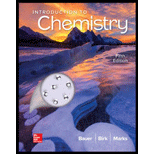
Concept explainers
Interpretation:
The mass of ammonium nitrate required to produce
Concept Introduction:
Ideal
Answer to Problem 119QP
Solution:
The mass of ammonium nitrate required to produce
Explanation of Solution
Given Information: The volume of
The reaction is as follows:
The volume of
Convert degree Celsius temperature in Kelvin:
Temperature
Convert pressure units from
For
Substitute
So, the number of moles of
The mass of
Substitute
The mass of ammonium nitrate required to produce
Want to see more full solutions like this?
Chapter 9 Solutions
INTRODUCTION TO CHEMISTRY(LL)-W/CONNECT
- Sulfur trioxide, SO3, is produced in enormous quantities each year for use in the synthesis of sulfuric acid. S(s)+O2(g)SO2(g)2SO2(g)+O2(g)2SO3(g) What volume of O2(g) at 350.C and a pressure of 5.25 atm is needed to completely convert 5.00 g sulfur to sulfur trioxide?arrow_forwardYou have an equimolar mixture of the gases SO2 and O2, along with some He, in a container fitted with a piston. The density of this mixture at STP is 1.924 g/L. Assume ideal behavior and constant temperature and pressure. a. What is the mole fraction of He in the original mixture? b. The SO2 and O2 react to completion to form SO3. What is the density of the gas mixture after the reaction is complete?arrow_forwardA chemist weighed out 5.14 g of a mixture containing unknown amounts of BaO(s) and CaO(s) and placed the sample in a 1.50-L flask containing CO2(g) at 30.0C and 750. torr. After the reaction to form BaCO3(s) and CaCO3(s) was completed, the pressure of CO2(g) remaining was 230. torr. Calculate the mass percentages of CaO(s) and BaO(s) in the mixture.arrow_forward
- A mixture contained calcium carbonate, CaCO3, and magnesium carbonate, MgCO3. A sample of this mixture weighing 7.85 g was reacted with excess hydrochloric acid. The reactions are CaCO3(g)+2HCL(aq)CaCl2(aq)+H2O(I)+CO2(g)MgCO3(s)+2HCL(aq)MgCl2(aq)+H2O(I)+CO2(g) If the sample reacted completely and produced 1.94 L of carbon dioxide, CO2, at 25C and 785 mmHg, what were the percentages of CaCO3 and MgCO3 in the mixture?arrow_forward47 HCl(g) reacts with ammonia gas, NH3(g), to form solid ammonium chloride. If a sample of ammonia occupying 250 mL at 21 C and a pressure of 140 torr is allowed to react with excess HCl, what mass of NH4Cl will form?arrow_forwardA mixture contained zinc sulfide, ZnS, and lead sulfide, PbS. A sample of the mixture weighing 6.12 g was reacted with an excess of hydrochloric acid. The reactions are ZnS(s)+2HCL(aq)ZnCl2(aq)+H2S(g)PbS(s)+2HCL(aq)PbCl2(aq)+H2S(g) If the sample reacted completely and produced 1.049 L of hydrogen sulfide, H2S, at 23C and 762 mmHg, what were the percentages of ZnS and PbS in the mixture?arrow_forward
- 50 The first step in processing zinc metal from its ore, ZnS, is to react it with O2 according to the reaction 2ZnS(s)+3O2(g)2ZnO(s)+2SO2(g) If 620 kg of ZnS is to be reacted, what volume of oxygen at 0.977 atm 34.0 C is needed (at a minimum) to carry out this reaction?arrow_forwardA sample of a smoke stack emission was collected into a 1.25-L tank at 752 mm Hg and analyzed. The analysis showed 92% CO2, 3.6% NO, 1.2% SO2, and 4.1% H2O by mass. What is the partial pressure exerted by each gas?arrow_forwardA collapsed balloon is filled with He to a volume of 12.5 L at a pressure of 1.00 atm. Oxygen, O2, is then added so that the final volume of the balloon is 26 L with a total pressure of 1.00 atm. The temperature, which remains constant throughout, is 21.5 C. (a) What mass of He does the balloon contain? (b) What is the final partial pressure of He in the balloon? (c) What is the partial pressure of O2 in the balloon? (d) What is the mole fraction of each gas?arrow_forward
 General Chemistry - Standalone book (MindTap Cour...ChemistryISBN:9781305580343Author:Steven D. Gammon, Ebbing, Darrell Ebbing, Steven D., Darrell; Gammon, Darrell Ebbing; Steven D. Gammon, Darrell D.; Gammon, Ebbing; Steven D. Gammon; DarrellPublisher:Cengage Learning
General Chemistry - Standalone book (MindTap Cour...ChemistryISBN:9781305580343Author:Steven D. Gammon, Ebbing, Darrell Ebbing, Steven D., Darrell; Gammon, Darrell Ebbing; Steven D. Gammon, Darrell D.; Gammon, Ebbing; Steven D. Gammon; DarrellPublisher:Cengage Learning Chemistry for Engineering StudentsChemistryISBN:9781337398909Author:Lawrence S. Brown, Tom HolmePublisher:Cengage Learning
Chemistry for Engineering StudentsChemistryISBN:9781337398909Author:Lawrence S. Brown, Tom HolmePublisher:Cengage Learning Chemistry & Chemical ReactivityChemistryISBN:9781337399074Author:John C. Kotz, Paul M. Treichel, John Townsend, David TreichelPublisher:Cengage Learning
Chemistry & Chemical ReactivityChemistryISBN:9781337399074Author:John C. Kotz, Paul M. Treichel, John Townsend, David TreichelPublisher:Cengage Learning Chemistry & Chemical ReactivityChemistryISBN:9781133949640Author:John C. Kotz, Paul M. Treichel, John Townsend, David TreichelPublisher:Cengage Learning
Chemistry & Chemical ReactivityChemistryISBN:9781133949640Author:John C. Kotz, Paul M. Treichel, John Townsend, David TreichelPublisher:Cengage Learning Chemistry: Principles and PracticeChemistryISBN:9780534420123Author:Daniel L. Reger, Scott R. Goode, David W. Ball, Edward MercerPublisher:Cengage Learning
Chemistry: Principles and PracticeChemistryISBN:9780534420123Author:Daniel L. Reger, Scott R. Goode, David W. Ball, Edward MercerPublisher:Cengage Learning Chemistry: Principles and ReactionsChemistryISBN:9781305079373Author:William L. Masterton, Cecile N. HurleyPublisher:Cengage Learning
Chemistry: Principles and ReactionsChemistryISBN:9781305079373Author:William L. Masterton, Cecile N. HurleyPublisher:Cengage Learning





